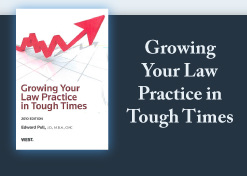|
In Praise of Unavailability
In a previous communication I noted that my wife Paula and I were planning a three week journey/vacation up and down the California and Oregon coasts. It was an enjoyable and worthwhile experience, one that took me away from the daily routine of work longer than at any time in my career (although of course I still used electronic technology to keep connected and be as productive as time off would allow). It brought home to me again that taking care of physical and mental health is a fundamental responsibility, one that makes professional life possible.
Certainly I know from my coaching experience that too many lawyers are close to burn-out or, at the very least, are unhappy in their day-to-day occupation. In fact, there are just too many reported cases of alcohol and drug abuse; how many such cases are not reported can only be left to the imagination. All successful people tend to work long hours and are focused on and passionate about what they do. In the effort to excel, made more intense by the pressure of economics, trying too much to succeed can cause problems for lawyers.
Often, lawyers make the argument that they simply cannot structure their practices to be away for any length of time, but there are ample illustrations to the contrary. An effective tool of time-off management is to assure that you are allowed to have your vacation without surprise attacks from your opposing counsel. When in litigation, preparing and filing with the court (and serving opposing counsel with) a "Notice of Unavailability" will go a long way to prevent sudden motions or deposition settings when you plan to be out of town for more than a few days.
This idea came to me in the late 1990s; it was not commonly used and most people never heard of it at the time. Since then, states as diverse as California, Florida, Georgia, New York and others seem to be aware of this procedure and some courts even have formal rules providing for it. Though still not widely discussed, this is a good technique to manage one's priorities and control one's own time for "renewal" (sometimes otherwise called "vacation") without worrying about someone back home seeking to take advantage of you and your client during your temporary absence from the office.
Lawyers typically think they always know what needs to be done, and that they can do it if they just work hard enough and fast enough. That's asking far too much of anyone, and it often produces self-defeating fear and paralysis. A thousand-mile journey is nothing more than a series of steps; tools like a notice of unavailability enable you to take them one at a time.
|
|

Following the worst economic crisis since the Great
Depression, and facing a sea change in clients' demands
and expectations, law firms must respond and adapt
quickly and effectively. Law firms must choose the kind of
law practice they will be; the marketing and business
development tactics they will use; the overhead that is
critical to their functioning; how to price, bill and collect
for services; and how to manage the cash flow cycle.
Success lies in identifying and capturing the right kinds of
clients, providing the services those clients need in ways
that add value, and ensuring prompt payment and the
ability to grow profits. This book, based on the
experiences of Ed and his clients over 20 years of
coaching and consulting, provides the keys to
successfully thriving in the new era.
Now Available
Special New Release Price: $79
Regular Price: $120
Call or Order Online at:
1-800-837-5880
www.lawbiz.com





|

|
|
|

Personal Commentary
The New York Times had an interesting article about Lance Armstrong and his foundation, LiveStrong. Apparently, the foundation may suffer in its donation efforts because of the increasing focus on Armstrong for allegedly taking banned substances while racing. The French, according to one sports analyst, love an underdog, until he/she becomes a champion and then love turns to hate...
until they retire. Then hate turns to love again. In Armstrong's case, perhaps the most tested athlete in the history of all sports, the French have been trying to convict him for years, but haven't been able to find any sample of his that was positive (for a banned substance).
But, now the U.S. grand jury, convening in Los Angeles, may call him. Others have been called. All are seeking to uncover the "smoking gun." So far, it's only been "he said" by Greg LeMond and Floyd Landis, both admitted liars and very unhappy people. So far, to my knowledge, Armstrong has vehemently denied "doping" from the get-go and has never been under oath. Thus, at this stage, if he were to get into trouble, it would only be his arrogance that would give him trouble for,
unlike Roger Clemons who recently was indicted for perjury, Armstrong has not committed any lie under oath.
What would you do if you were his lawyer? What advice would you give one of the most celebrated sports celebrities? Would you advise him not to testify before a grand jury, even if contempt were a possible punishment, if he were to be called?
Why can't we believe he was so good without taking banned substances? Just because Roger Clemons or Floyd Landis did doesn't mean Lance Armstrong did. At this stage, the end of Armstrong's racing career, the continued persecution (yes, not just prosecution) could do more harm to many people whose health issues could be compromised if the foundation faltered, even if one person were to be erroneously exculpated.
Best wishes,
Ed Poll
lawbiz.com
lawbizblog.com
www.LawBizForum.com
800-837-5880
Please use the URL below to link to this issue:
www.lawbiz.com/nlimages/tip-8-24-10.html
|

|

What Readers Are Saying...
"No matter how you slice it, there is
no substitute for wisdom and
experience. Ed Poll has
demonstrated both in this eyeopening
book about the essential
elements of running a profitable law
practice. He provides practical
wisdom along with simple ways to
adopt and incorporate best practices
for each. After explaining the pros
and cons of every decision, he makes
recommendations and provides
useful guides disguised as key
principles. Buy the book so you too
can access Ed's wisdom and
experience. It's worth much more
than the investment."
STEWART L. LEVINE. ESQ.,
FOUNDER, RESOLUTIONWORKS
AUTHOR, GETTING TO RESOLUTION;
THE BOOK OF AGREEMENT AND
COLLABORATION 2.0
|

|

|






